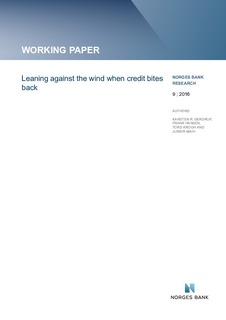Leaning Against the Wind When Credit Bites Back
Working paper
Published version
Permanent lenke
http://hdl.handle.net/11250/2495720Utgivelsesdato
2016Metadata
Vis full innførselSamlinger
Sammendrag
This paper analyzes the cost-benefit trade-off of leaning against the wind (LAW) in monetary policy. Our starting point is a New Keynesian Markov-switching model where the economy can be in a normal state or in a crisis state. The set-up enables us to weigh benefits against costs for different systematic LAW policies. We find that the benefits of LAW in terms of a lower frequency of severe financial recessions exceed costs in terms of higher volatility in output and in inflation in normal times when i) agents underestimate crisis risk, and ii) the severity of crises is endogenous (i.e. when "credit bites back"). Furthermore, we find that using an asymmetric rule that only includes positive credit growth can reduce the frequency of severe financial recessions even further, but that this comes at the cost of higher volatility in normal times. Finally, we find that LAW policies can lead to relatively higher output volatility in normal times when agents perceive crisis risk correctly because they are already internalizing the risk of lower future consumption by reducing consumption today.

